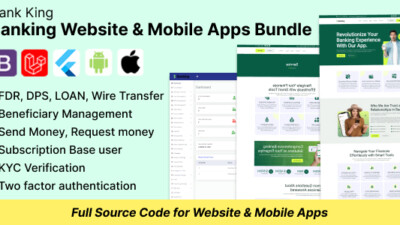Medicare is a cutting-edge, full-stack Clinic Management System (CMS) tailored to transform healthcare practices. Designed for single-doctor clinics to multi-specialty hospitals, Medicare simplifies clinic operations, enhances patient care, and optimizes administrative efficiency.
Key Features:
- Multi-platform support (Web, Admin, User, Doctor Apps)
- Video consultations with Zoom integration
- Queue management and patient file handling
- Detailed appointment management
- Prescription and payment tracking
This intuitive, user-friendly system ensures seamless communication between clinic staff, doctors, and patients, creating a more efficient and patient-focused healthcare environment.
Discover how Medicare can adapt to the unique needs of your healthcare facility and take your practice to the next level.

For a better demo experience, please create a demo user account from the user app and a delivery man credential from your demo admin panel to use the delivery man app.
Core Functionalities
Managing appointments is one of the core functionalities of
Medicare. Once the doctors are set up, both the admin and patients
can generate appointments. Appointments can be managed by the
admin, front desk, and doctor, ensuring a smooth workflow across
all parties involved.
- Generate Appointment
- Appointment From Admin Panel
- Go to the Appointments section in the Admin Panel.
- Click on Add New.
-
Add a new patient or select an existing patient from the
list. -
Fill in the appointment details, including selecting the
doctor, appointment type, and appointment date and time and
other information. - Click Add Appointment.
- You can find the added appointment in appointment section.
- Appointment From User App
- Click on the doctors or Go to the Department Page or the Search Page.
- Click on Book Now.
-
Select the appointment type and choose the date and time for
the appointment. -
Select an patient or click Add New Patient to enter a new
patient’s details. - Choose the payment option and confirm the booking.
- Appointment From web App
- Click on the Get Appointment button.
- Select the doctor for the appointment.
- Choose the date and time for the appointment.
- Select an existing patient or add a new patient.
- Choose the payment option (if applicable).
- Click Confirm Booking to finalize the appointment.
- Manage Appointment
- Update Patient Details
- Update Doctor
- Update Appointment Status
-
Confirmed – Initially, all appointments are
generated with the “Confirmed” status. This status can be
changed later based on further actions or updates. -
Pending – This status indicates that the
appointment is not yet confirmed. It can either be rejected
or rescheduled based on further actions. -
Visited – This status indicates that the
doctor has checked the patient and the appointment has been
completed successfully. Note that once an appointment is
updated to “Visited,” it cannot be reverted or changed to
another status. -
Completed – This status indicates that the
appointment was a video consultation and has been
successfully completed by the doctor. Note that once an
appointment is updated to “Completed,” it cannot be reverted
or changed to another status. -
Rescheduled – This status is used when the
appointment date or time is changed. The rescheduling
operation can only be performed through the Admin Panel. -
Rejected – This status indicates that the
appointment has been rejected. This action is taken through
the Admin. -
Cancelled – This status indicates that the
appointment has been canceled by the user. The cancellation
process begins when the user submits a cancellation request
from the User App (Edit Appointment page). The admin can
then view the request in the “Edit Appointment” page or the
“Cancellation Requests” page. If the admin approves the
request, the appointment status is updated to “Cancelled.” - Add/Update/Print Prescriptions
- Patient File
- Appointment Checkins
- Appointment Cancellation
- Appointment Calender
- Appointment Payment
- Join Video Call
- Transaction
-
All Transactions: Displays transaction IDs and detailed
records of all transactions. -
Invoice: Contains the invoice details associated with each
transaction. -
Payment: Shows the attached transaction ID along with the
invoice ID and other relevant details.
Appointments can be generated from the Admin Panel, Web App, and
Mobile App. Let’s understand how appointments can be generated
in each of these platforms.



Admin, doctors, and front desk staff can find the generated
appointments in the Appointment List, Dashboard, and Appointment
Calendar. From these sections, they can view and edit the
appointment details as needed.
From the “Edit Appointment” page, you can update the patient’s
details by clicking the link button associated with the
patient’s information. This button will navigate you to the
Patient Details page, where you can update the patient’s
information as needed.
You cannot update the doctor for an existing appointment. If a
change is required, you must reject the current appointment
and create a new one with the updated doctor details
Our system supports a total of seven appointment statuses,
each representing a specific stage in the appointment process.
These statuses help track and manage appointments efficiently,
ensuring clear communication between admins, doctors, and
patients.

The prescription can be checked from the “Edit Appointment” page
or the “Prescription” page. You can add or update the
prescription directly from the “Edit Appointment” page by
entering the necessary details and saving the changes.
Remember, if you want to map all medicines, press the “New
Medicine” button or go to the “Medicine” page to add new
medicines. Once you’ve mapped all the medicines, there’s no need
to type them multiple times; you can simply select them from the
list.
Print Prescription –
Once you have added the prescription, you can easily print it
from the Prescription List. Simply click the “Print” button to
generate a printable version of the prescription.

The patient file can be checked and added from the “Edit
Appointment” page or the “Patient File” page. To add a new file,
go to the “Patient File” page and press the “Add New” button.
Fill out the required form and press “Add File” to save the
file. You can add, update and delete reports or any other files
related to the patient.

Appointment Check-in is an additional and exciting feature of
Medicare. You can check in the patient and generate a queue
number, which will be displayed on the clinic screen. The user
can also view their queue number from the appointment details
page.
Once the patient arrives at your clinic, you can check in the
appointment from the Check-in page. To do so, press the
“Check-in” button, where you can fill out the check-in form or
scan the QR code. The QR code can be obtained from the user’s
phone on the Appointment Details page.

In the case of appointment cancellations or rejections, a refund
will be generated only for paid appointments. This applies when
the payment for the appointment was initiated by the user and
successfully captured.

From this page, you can view all appointments with their
scheduled times. The appointments are arranged in a calendar
view, making it easy for the admin to see appointments on a
daily basis. This layout helps in quickly identifying and
managing appointments.
In the Appointment Details page, you can view the appointment
invoice, transaction details, and payment methods. This allows
you to track the payment status and manage financial
transactions related to the appointment.
Before starting the video appointment, make sure you have
configured Zoom in the Admin Settings page.
For video calls, we are using Zoom. In the Appointment Details
page, find the meeting link field and click on the link button.
This will navigate you to the Zoom link, where you can wait for
the user to join the meeting.
Users can also join the meeting from the Appointment Details
page (User App) by clicking the “Video Call” button.
Remember, if you reject or reschedule the appointment, the
change will also be reflected in the Zoom panel. The appointment
will be deleted or rescheduled accordingly in Zoom as well.

On this page, you will find three tabs: All Transactions,
Payment, and Invoice. When a user completes a transaction, the
record is stored in the Transaction section.



























